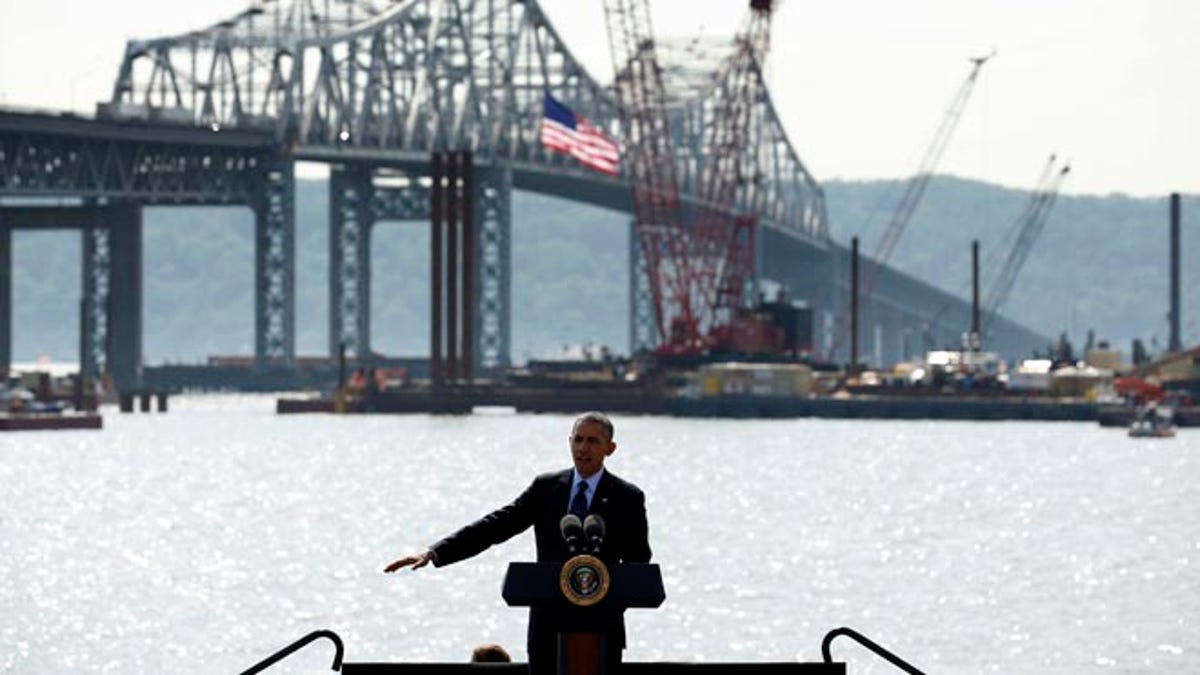
FILE: May 14, 2014: President Obama speaks on transportation infrastructure, near the Tappan Zee Bridge, Tarrytown, New York. (REUTERS)
The House voted Tuesday in favor of a short-term, multi-billion dollar fix to the Highway Trust Fund, which helps pay for federal highway and transit programs.
President Obama spent the last several weeks at campaign-style public events -- including ones with the backdrop of Delaware and Virginia bridges -- trying to garner public support for the $10.8 billion bill and to convince Congress to approve the funding.
In voting in favor of the bill, 367 to 55, the Republican-controlled House keeps the fund from going broke in the coming weeks but leaves open the chore of finding a long-term fix.
The Senate has yet to vote on a similar bill.
Democrats and Republicans argued back and forth on the House floor before the vote -- largely over the short-term solution and the provision that cuts the federal gas tax from 18.4 cents a gallon to less than 4 cents a gallon.
“Passing extension after extension just maintains the status quo,” said West Virginia Rep. Nick Rahall, the top Democrat on the House Transportation Committee. “I'm going to vote for this bill today regardless of it's not the best solution.”
Some lawmakers wanted to increase the 24.4-cents-a-gallon tax on diesel gas, which hasn't been increased in over 20 years.
Others were reluctant to raise taxes in an election year -- especially Republicans for whom a vote in favor of any tax increase could trigger a backlash from their party's base.
“These are difficult decisions in difficult times in an election year," said House Speaker John Boehner, R-Ohio, defending the bill while acknowledging its limits. "The long-term problem is still there and needs to be addressed."
The bill instead cobbles together $10.8 billion by using pension tax changes, customs fees and money from a fund to repair leaking underground fuel storage tanks.
The Transportation Department had warned unless Congress helped, by the first week in August, the fund would no longer have enough money to cover promised aid to states and that the government would begin to stretch out payments.
If the funding went broke, it also was expected to freeze thousands of transportation and infrastructure projects across the country and cost about 800,000 jobs.
Congress has kept the fund teetering on the edge of bankruptcy since 2008 through a series of temporary fixes because lawmakers have been unable to find a politically acceptable long-term funding solution.
The bill passed Tuesday relies on tax changes that are forecast to generate revenue over 10 years, but provide only enough money to keep the highway and transit programs going for another 10 months.
The largest chunk of the money, $6.4 billion, results from allowing employers to defer payments to their employee pension plans. Funding pension plans normally results in a tax savings for companies, and deferring those payments means they will pay more in taxes and increase federal revenue.
Obama, touring a transportation research center in Virginia on Tuesday, said he supports the House and Senate bills but wants more.
"All this does is set us up for the same crisis a few months from now,” he said. “So Congress shouldn't pat itself on the back for averting disaster for a few months."
Earlier this year, Obama offered a $302 billion plan to increase transportation spending and keep programs going for another four years. The plan, which was paid for by closing business tax loopholes, was received coolly by Republicans.
Democrats complain that it won't be any easier under the GOP bill to reach a compromise on sustainable, long-term means to pay for programs by pushing off a decision until next year, when the presidential campaign is heating up.
Republicans, however, may be in a better position to shape a transportation bill to their liking next year if they re-take control of the Senate in this fall's midterm elections.
Republicans are divided over transportation policy. A significant minority of the party's more conservative House members want to slash federal gas and diesel taxes, dramatically scale back transportation aid and leave it to states to come up with the money to pay for roads, bridges, buses and trains.
The conservative Club for Growth and Heritage Action for America, which are influential with Tea Party Republicans, urged lawmakers to vote against Tuesday's bill. But as a sop to conservatives, House GOP leaders allowed an amendment by Rep. Tom Graves, R-Ga., that says Congress should "increase the authority and responsibility of the states" to fund and manage their transportation systems.
Fox News’ Chad Pergram and The Associated Press contributed to this story.











































